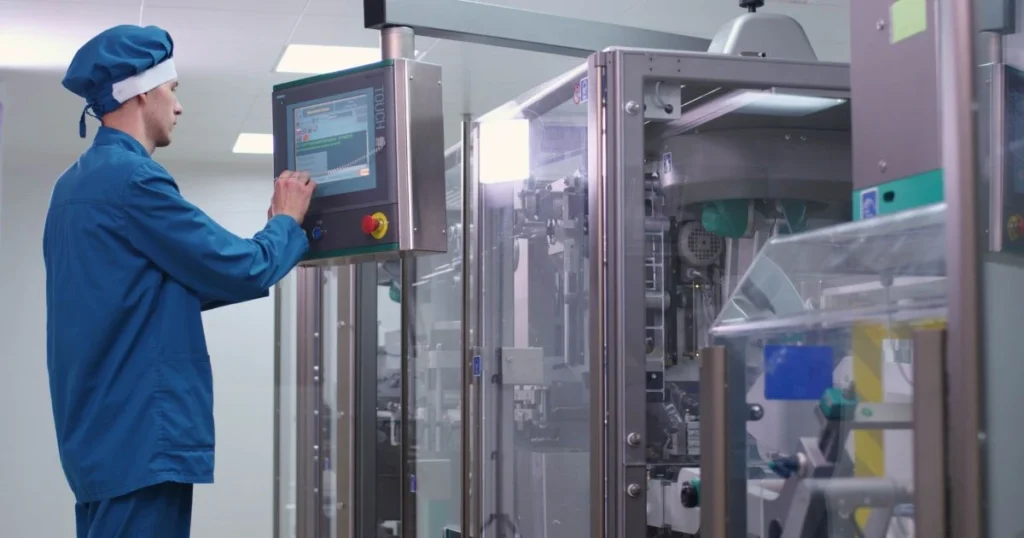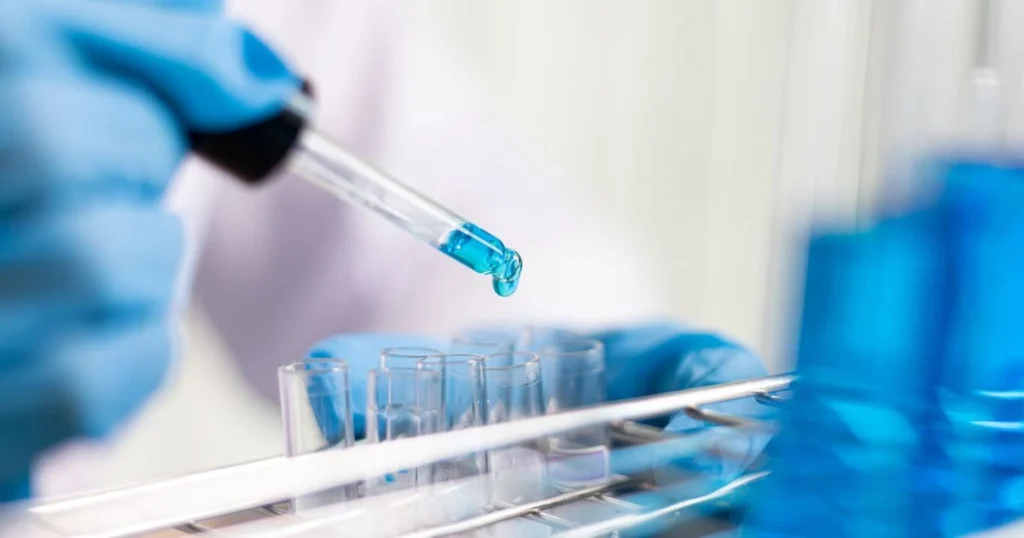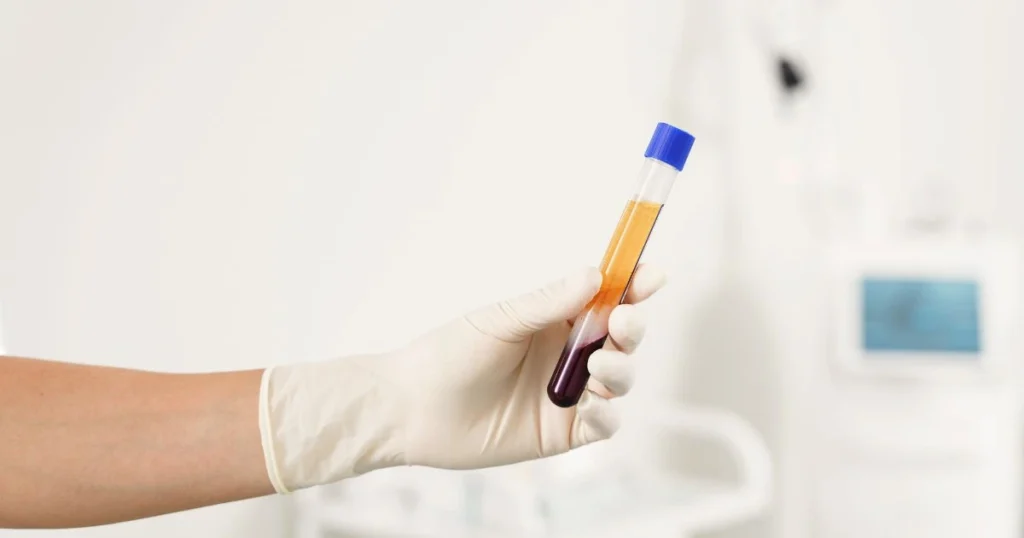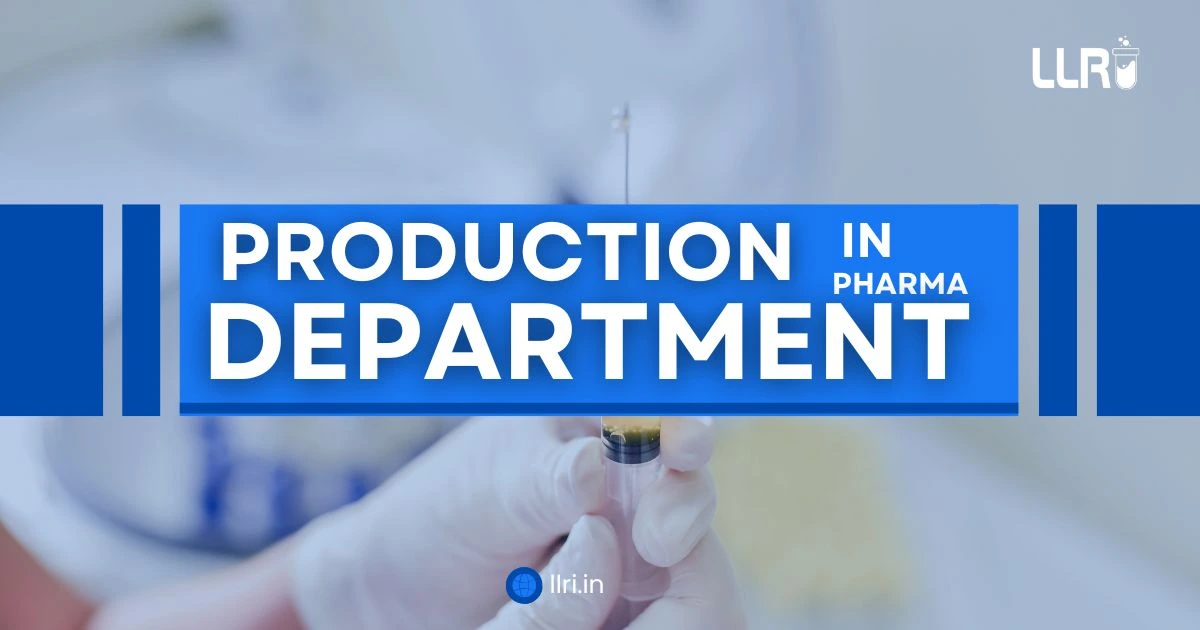Production Department in Pharmaceutical Industry: Have you ever wondered how a small white pill ends up neatly packed and ready at your local pharmacy? Well, there’s a massive, well-organised machine working behind the scenes, and at the centre of it all is the production department in pharmaceutical industry. This department is responsible for taking a formula and turning it into something real, whether that’s tablets, capsules, syrups, or injections.
From blending raw materials to final packaging, it’s this department that keeps the wheels turning in the pharmaceutical world.
As Dr. Zeenath, HD at LLRI puts it, “A drug may be discovered in the lab, but it only becomes valuable when it can be produced reliably at scale.”
Table of Contents
What is Production Department in Pharmaceutical Industry?
The production department in pharmaceutical industry refers to the team and infrastructure responsible for manufacturing drug products on a commercial scale. This includes handling materials, following procedures, and maintaining records for everything they make.
So, what is production department in pharmaceutical industry actually in charge of? Here’s a straightforward breakdown:
- Managing equipment and materials
- Ensuring quality during every step of production
- Meeting deadlines and batch targets
- Keeping everything clean, safe, and compliant
Their daily tasks aren’t just about hitting numbers, they’re about making sure each product meets specific standards, without fail.

Why Is the Production Department So Important?
Let’s be real: without this department, no medicine would reach patients.
The role of production department in pharmaceutical industry is to bridge the gap between the lab and the market. Scientists can invent a new drug, but without a skilled production team, there’s no way to make it in bulk or meet health regulations.
Here’s why their work matters:
- Regulatory compliance: Every action must be recorded. If something goes wrong, the department should trace the problem instantly.
- Batch uniformity: Whether it’s the first tablet or the ten-thousandth, it must be the same.
- Meeting demand: Hospitals and pharmacies rely on timely delivery. Delays can affect patient care.
Structure of a Production Department
So, who does what inside this powerhouse department? Let’s find out here:
1. Production Manager
Heads the department. Responsible for planning, people, and process.
2. Supervisors
These are the boots on the ground, making sure day-to-day operations are smooth.
3. Machine Operators
They run the machinery and know exactly how to manage a production line.
4. Technicians
From troubleshooting to maintenance, they keep things running.
Each role is part of a chain. If one link weakens, everything slows down or stops.
Core Functions of Production Department
Now let’s get into the production department functions. These are the actual hands-on activities carried out on a daily basis:
a. Dispensing
This is where materials are weighed and measured accurately. It’s the first and most sensitive step.
b. Granulation
Active ingredients are blended and processed into granules for better flow and compression.
c. Compression or Filling
Granules are turned into tablets, or filled into capsules using machines.
d. Coating
If needed, tablets are coated for taste, appearance, or controlled release.
e. Packaging
Final products are sealed, labelled, and boxed, ready for dispatch.
Each of these stages must follow Good Manufacturing Practices (GMP). Even a tiny mistake can lead to batch rejection.

If you want to know how it all actually works:
Here’s an example from a production unit in Hyderabad.
Morning starts with equipment inspection. The team checks that machines are clean and ready. Next, they begin granulation for a paracetamol batch. The supervisor cross-verifies raw material weights and ensures everything matches the batch manufacturing record (BMR).
Meanwhile, another team is in the packaging section, sealing blister packs and doing quality checks. At every step, documentation is being updated. This is not just for internal tracking, but to stay compliant with audits from the Drugs Controller General of India (DCGI).
Read More: SOP in Pharmaceutical Industry: How to Write It?
Role of Production Department in Pharmaceutical Industry
Still wondering about the exact role of production department in pharmaceutical industry? Let’s look at it like this, if R&D is the brain, production is the hands and heart.
They’re responsible for:
- Translating formulas into final dosage forms
- Following Standard Operating Procedures (SOPs)
- Minimising waste while maximising quality
- Supporting scale-up from pilot batches to full production
- Training staff on hygiene and safety practices
Challenges Faced by the Production Team
Of course, it’s not always a smooth ride. The production department often battles with:
- Machine downtime: Even a short failure can delay thousands of tablets.
- Regulatory pressure: With strict FDA and local body inspections, one mistake can cost crores.
- Manpower issues: Staff turnover or unskilled operators can slow things down.
- Supply chain delays: If raw materials arrive late, everything gets held up.
Despite all this, the team has to stay calm, focused, and accurate. That’s not an easy job!
How Is Technology Changing the Game?
Thanks to automation, things are improving fast. Here’s how tech is making life easier:
- Automated Dispensing Systems reduce human error
- SCADA & DCS Software allow live monitoring of equipment
- Barcode Tracking helps prevent mix-ups in packaging
- Batch Manufacturing Records (eBMRs) now go digital
Plants in Bangalore and Ahmedabad have already seen a 30% reduction in errors after switching to digital production records.
Alright, let’s quickly do a wrap up with key info:
- The production department in pharmaceutical industry is vital for turning raw materials into finished medicines.
- It answers the big question: what is production department in pharmaceutical industry? it’s the core team making drug manufacturing happen.
- The role of production department in pharmaceutical industry involves planning, producing, monitoring, and documenting every batch.
- Daily production department functions include dispensing, granulation, compression, and packaging.
- Despite challenges, this department keeps healthcare systems moving quite literally.

On A Final Note…
If you’re a pharmacy student, quality analyst, or simply someone curious about drug manufacturing, visiting a production unit (even virtually) can be a real eye-opener. You’ll see just how precise, demanding, and important this department is.
And if you’re aiming for a career here? Learn about GMP, SOPs, and documentation. That’s your ticket in. You can check out LLRI’s blogs to learn more about these here!
FAQs
Q1: What is the difference between production and manufacturing in pharma?
Manufacturing is the broader term covering all activities, including quality control and packaging. Production is specifically about making the drug product.
Q2: Is the production department only involved in tablet making?
No. It also handles capsules, syrups, injections, and creams depending on the facility.
Q3: Do production workers need pharma degrees?
Not always. Operators often have diplomas or ITI backgrounds, while supervisors and managers usually have degrees in pharmacy or engineering.
Q4: How do audits affect the production department?
Audits are intense. If records aren’t perfect or the area isn’t clean, the entire batch or plant can be shut down.
Q5: Can AI help in production?
Yes, predictive maintenance and real-time batch monitoring using AI is already happening in advanced facilities.

